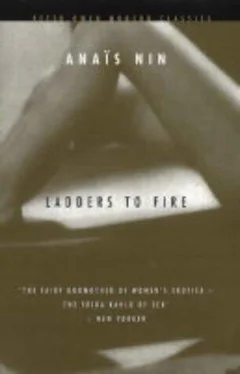Anaïs Nin - Ladders to Fire
Здесь есть возможность читать онлайн «Anaïs Nin - Ladders to Fire» весь текст электронной книги совершенно бесплатно (целиком полную версию без сокращений). В некоторых случаях можно слушать аудио, скачать через торрент в формате fb2 и присутствует краткое содержание. Год выпуска: 2004, ISBN: 2004, Издательство: Peter Owen Limited, Жанр: Классическая проза, Эротические любовные романы, на английском языке. Описание произведения, (предисловие) а так же отзывы посетителей доступны на портале библиотеки ЛибКат.
- Название:Ladders to Fire
- Автор:
- Издательство:Peter Owen Limited
- Жанр:
- Год:2004
- ISBN:9780720611625
- Рейтинг книги:5 / 5. Голосов: 1
-
Избранное:Добавить в избранное
- Отзывы:
-
Ваша оценка:
- 100
- 1
- 2
- 3
- 4
- 5
Ladders to Fire: краткое содержание, описание и аннотация
Предлагаем к чтению аннотацию, описание, краткое содержание или предисловие (зависит от того, что написал сам автор книги «Ladders to Fire»). Если вы не нашли необходимую информацию о книге — напишите в комментариях, мы постараемся отыскать её.
Cities of the Interior
Children of the Albatross
The Four-Chambered Heart
A Spy in the House of Love
Solar Barque
Ladders to Fire — читать онлайн бесплатно полную книгу (весь текст) целиком
Ниже представлен текст книги, разбитый по страницам. Система сохранения места последней прочитанной страницы, позволяет с удобством читать онлайн бесплатно книгу «Ladders to Fire», без необходимости каждый раз заново искать на чём Вы остановились. Поставьте закладку, и сможете в любой момент перейти на страницу, на которой закончили чтение.
Интервал:
Закладка:
“I feel,” said Lillian, “that I do everything wrong. I feel I do everything to bring about just what I fear. You will turn away from me too.”
Lillian’s unsatisfied hunger for life had evoked in Djuna another hunger. This hunger still hovered at times over the bright film of her eyes, shading them not with the violet shadows of either illness or sensual excess, of experience or fever, but with the pearl-grey shadow of denial, and Djuna said:
“I was born in the most utter poverty. My mother lying in bed with consumption, four brothers and sisters loudly claiming food and care, and I having to be the mother and nurse of them all. We were so hungry that we ate all the samples of food or medicines which were left at the house. I remember once we ate a whole box of chocolate-coated constipation pills. Father was a taxi driver but he spent the greatest part of what he made on drink along the way. As we lived among people who were all living as we were, without sufficient clothing, or heat or food, we knew no contrast and believed this was natural and general. But with me it was different. I suffered from other kinds of pangs. I was prone to the most excessive dreaming, of such intensity and realism that when I awakened I felt I lost an entire universe of legends, myths, figures and cities of such color that they made our room seem a thousand times more bare, the poverty of the table more acute. The disproportion was immense. And I’m not speaking merely of the banquets which were so obviously compensatory! Nor of the obvious way by which I filled my poor wardrobe. It was more than that. I saw in my dreams houses, forests, entire cities, and such a variety of personages that even today I wonder how a child, who had not even seen pictures, could invent such designs in textures, such colonnades, friezes, fabulous animals, statues, colors, as I did. And the activity! My dreams were so full of activity that at times I felt it was the dreams which exhausted me rather than all the washing, ironing, shopping, mending, sweeping, tending, nursing, dusting that I did. I remember I had to break soap boxes to burn in the fireplace. I used to scratch my hands and bruise my toes. Yet when my mother caressed me and said, you look tired, Djuna, I almost felt like confessing to her that what had tired me was my constant dreaming of a ship which insisted on sailing through a city, or my voyage in a chaise through the snow-covered steppes of Russia. And by the way, there was a lot of confusion of places and methods of travel in my dreams, as there must be in the dreams of the blind. Do you know what I think now? I think what tired me was the intensity of the pleasures I had together with the perfect awareness that such pleasure could not last and would be immediately followed by its opposite. Once out of my dreams, the only certitude I retained from these nocturnal expeditions was that pleasure could not possibly last. This conviction was strengthened by the fact that no matter how small a pleasure I wanted to take during the day it was followed by catastrophe. If I relaxed for one instant the watch over my sick mother to eat an orange all by myself in some abanoned lot, she would have a turn for the worse. Or if I spent some time looking at the pictures outside of the movie house one of my brothers or sisters would cut himself or burn his finger or get into a fight with another child. So I felt then that liberty must be paid for heavily. I learned a most severe accounting which was to consider pleasure as the jewel, a kind of stolen jewel for which one must be willing to pay vast sums in suffering and guilt. Even today, Lillian, when something very marvelous happens to me, when I attain love or ecstasy or a perfect moment, I expect it to be followed by pain.”
Then Lillian leaned over and kissed Djuna warmly: “I want to protect you.”
“We give each other courage.”
The mist came into the room. Djuna thought: She’s such a hurt woman. She is one who does not know what she suffers from, or why, or how to overcome it. She is all unconscious, motion, music. She is afraid to see, to analyze her nature. She thinks that nature just is and that nothing can be done about it. She would never have invented ships to conquer the sea, machines to create light where there was darkness. She would never have harnessed water power, electric power. She is like the primitive. She thinks it is all beyond her power. She accepts chaos. She suffers mutely…
“Djuna, tell me all that happened to you. I keep thinking about your hunger. I feel the pangs of it in my own stomach.”
“My mother died,” continued Djuna. “One of my brothers was hurt in an accident while playing in the street and crippled. Another was taken to the insane asylum. He harmed nobody. When the war started he began to eat flowers stolen from the florists. When he was arrested he said that he was eating flowers to bring peace to the world. That if everybody ate flowers peace would come to the world. My sister and I were put in an orphan asylum. I remember the day we were taken there. The night before I had a dream about a Chinese pagoda all in gold, filled with a marvelous odor. At the tip of the pagoda there was a mechanical bird who sang one little song repeatedly. I kept hearing this song and smelling the odor all the time and that seemed more real to me than the callous hands of the orphan asylum women when they changed me into a uniform. Oh, the greyness of those dresses! And if only the windows had been normal. But they were long and narrow, Lillian. Everything is changed when you look at it through long and narrow windows. It’s as if the sky itself were compressed, limited. To me they were like the windows of a prison. The food was dark, and tasteless, like slime. The children were cruel to each other. No one visited us. And then there was the old watchman who made the rounds at night. He often lifted the corners of our bedcovers, and let his eyes rove and sometimes more than his eyes… He became the demon of the night for us little girls.”
There was a silence, during which both Lillian and Djuna became children, listening to the watchman of the night become the demon of the night, the tutor of the forbidden, the initiator breaking the sheltered core of the child, breaking the innocence and staining the beds of adolescence.
“The satyr of the asylum,” said Djuna, “who became also our jailer because when we grew older and wanted to slip out at night to go out with the boys, it was he who rattled the keys and prevented us. But for him we might have been free at times, but he watched us, and the women looked up to him for his fanaticism in keeping us from the street. The orphan asylum had a system which permitted families to adopt the orphans. But as it was known that the asylum supplied the sum of thirty-five dollars a month towards the feeding of the child, those who responded were most often those in need of the thirty-five dollars. Poor families, already burdened with many children, came forward to ‘adopt’ new ones. The orphans were allowed to enter these homes in which they found themselves doubly cheated. For at least in the asylum we had no illusion, no hope of love. But we did have illusions about the adoptions. We thought we would find a family. In most cases we did not even imagine that these families had children of their own. We expected to be a much wanted and only child! I was placed in one of them. The first thing that happened was that the other children were jealous of the intruder. And the spectacle of the love lavished on the legitimate children was terribly painful. It made me feel more abandoned, more hungry, more orphaned than ever. Every time a parent embraced his child I suffered so much that finally I ran away back to the asylum. And I was not the only one. And besides this emotional starvation we got even less to eat—the allowance being spent on the whole family. And now I lost my last treasure: the dreaming. For nothing in the dreams took the place of the human warmth I had witnessed. Now I felt utterly poor, because I could not create a human companion.”
Читать дальшеИнтервал:
Закладка:
Похожие книги на «Ladders to Fire»
Представляем Вашему вниманию похожие книги на «Ladders to Fire» списком для выбора. Мы отобрали схожую по названию и смыслу литературу в надежде предоставить читателям больше вариантов отыскать новые, интересные, ещё непрочитанные произведения.
Обсуждение, отзывы о книге «Ladders to Fire» и просто собственные мнения читателей. Оставьте ваши комментарии, напишите, что Вы думаете о произведении, его смысле или главных героях. Укажите что конкретно понравилось, а что нет, и почему Вы так считаете.












